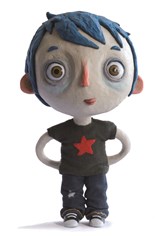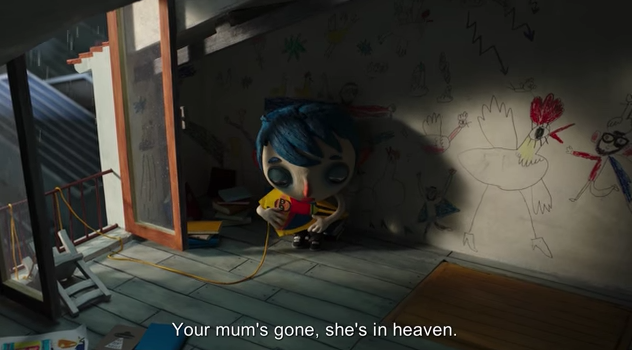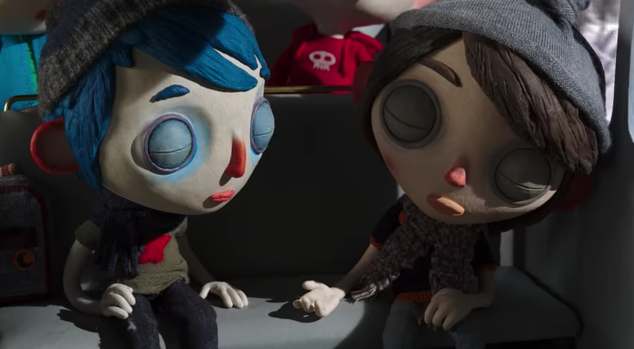Interview: Céline Sciamma on "My Life as a Zucchini" and life after "Girlhood"
 Wednesday, March 1, 2017 at 5:10PM
Wednesday, March 1, 2017 at 5:10PM The past couple of years have featured many conversations about the need for fresh voices of all races and genders and sexual orientations in the movies. Consider it a healthy sign for the future that when this conversation comes up, there are dozens and dozens of young directors out there to champion. Certainly one of the most exciting newish female writer/directors working is Céline Sciamma in France. In the past ten years she's established herself as a revelatory voice in the genre of coming-of-age films, starting with her César nominated debut Water Lilies (2007) and reaching a new level of critical interest and popularity with Girlhood (2014). But, in something of a left turn -- which she says is no left turn at all -- she hasn't been behind the camera this past year but behind the screenplays of two acclaimed pictures.

She cowrote Andre Techine's well received LGBT film Being 17 and this past weekend her latest film, her first to win an Oscar nomination, My Life as a Zucchini, opened in US theaters. You should definitely go see it. She adapted the screenplay for this charming melancholy story about orphans hoping to find a home from a novel by Gilles Paris. Our interview is after the jump...
The following interview was conducted shortly before the Oscars...
 NATHANIEL: You usually direct your own material. How did this one come about?
NATHANIEL: You usually direct your own material. How did this one come about?
CELINE SCIAMMA: I studied screenwriting. In fact, I've always done both. After my first film I wrote for TV shows and co-wrote a lot of screenplays. Some came out. This one came up from the producers of My Life as a a Zucchini. I knew them and had worked a little bit with them previously. It was right after Tomboy (2011). I had written about childhood so it made sense.
Your films have such great specificity about youth. You're in your 30s so how do you remember all this? You have a great recall for how it feels.
I guess when I began to write I was quite young. When I did my first film I was 26. I thought that was why. I wanted to talk about something I knew. But growing older it still goes on. I have a very accurate memory of what childhood felt like, I think, because I was already an observer [as a child].
You don't strike me as a very talky filmmaker so when you're writing a film do you include a lot of visual details?
I put a lot of mise-en-scène in the script - I'm quite accurate about it, the rhythm of the scene and a take.
There are so many images that are strong in Zucchini but since it's an animated film and they take so long to make, did you see it along the way?
I wrote the script in 2012 and it took four years to see an image (Laughter). I didn't go on the set. I wrote it as a film, making no difference [from live action]. You can allow yourself a lot with animated films but this one is naturalistic. There was no place for an imaginary world. If I would be writing for Pixar it would be different.
It was quite disturbing how much of the film was exactly what I wrote. When I wrote for Andre Techine, the film [Being 17], is totally different -- live action, and the actors; it's a different process. You recognize the script but it's different.

It's so hard to imagine anything like this being made in the US. There's this European frankness about childhood. Do you think the distance of animation helps with the frankness?
It allowed us to be more bold and more brave. The scene where he kills the mother [An accident at the very beginning of the film - Editor]. If it was live action, you'd think -- we're putting a real kid through that? It allows you to go further I think, politically. There's a little distance with the fact that it's a puppet. It's not a cold distance but you're more surprised by your own emotions and how you relate to an object that is obviously a puppet.
When you were watching it for the first time, what surprised you most?
The thing that struck me was how sensitive the animation was, the movements. I think it's pretty rare and true. The way they hold hands, that was insane. I didn't think it would be that, I don't know... [trails off]

NATHANIEL R: Agreed. The gestures were very strong and emotionally affecting.
CELINE SCIAMMA: Every time I see the film, many times now, I keep crying. I know it by heart so it shouldn't be moving. When you cry watching your own stuff it's usually because you remember how painful it was to make it!
[Laughter] But Zucchini has this great line about 'Sometimes people cry when they're happy.'
That's when I start to cry each time watching the film!
Did you know what the characters would look like ahead of time? I loved that all of the eyes were circled with a different color. It reminded me of black eyes but in a very subtle way --- an allusion to how rough the childhoods had been?
When they asked me to write the script they did already have sketches of the characters. So it really felt like writing for a character. I knew all the faces, not the voices, but the looks. It helped with the writing, like knowing an actor and writing for them. I already felt intimacy.
Before you go, and not to put any pressure on you, but how on Earth are you going to follow up Girlhood because that was pretty spectacular?!
Thank you! I'm starting to write for myself right now, my next feature. I can't tell you much about it. It's a secret even to me [Laughter]
Girlhood got a lot of critical attention in the US and at festivals. Have you felt a difference in your career?
Yes. The film is on Netflix now and I can definitely -- I have an agent there. It doesn't change my every day life but I do feel there's a recognition, growing from film to film. But I'm still a little French filmmaker!
Do you ever hear from Rihanna about that perfect "Diamonds" scene in Girlhood ?
They had to like the scene. They saw the scene and then gave us the rights. But I haven't heard from her, personally. I hope one day to know. If she's at the Oscars, I will go and say "Hey!" I have the clip on my phone and I'll show her!

previous interviews | more French films | more animated films



Reader Comments (2)
Ugh, she is so great. Tomboy and Girlhood especially are just so so great. The writing of Being 17 was, I thought, the film's strongest part.
I briefly met her, too. Lovely.
Great interview.